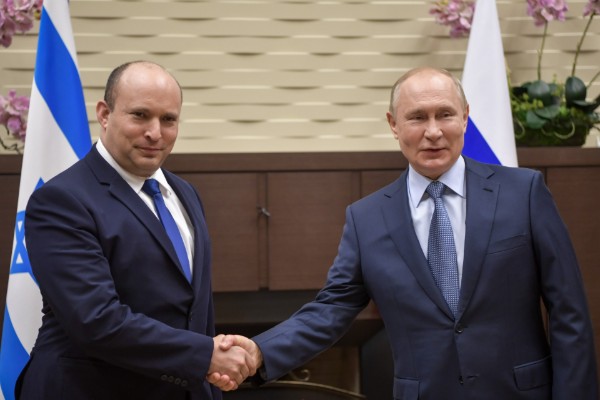Bennett is the first Western leader to meet with Putin since Russia’s invasion.
By David Hellerman, World Israel News
Israeli Prime Minister Naftali Bennett met with Russian President Vladimir Putin in Moscow on Saturday in a surprise visit to discuss the war in Ukraine.
Bennett’s spokesman told reporters the Prime Minister called Ukrainian President Volodymyr Zelensky to update him on the three-hour meeting.
Bennett is en route to Berlin to update German Chancellor Olaf Scholz before returning to Israel.
Bennett is the first Western leader to meet with Putin since Russia’s invasion 10 days ago, which has left Moscow diplomatically isolated.
The visit came days after Bennett discussed the war in phone calls with both Putin and Ukrainian President Volodymyr Zelensky. Zelensky has been seeking Israeli mediation.
The Prime Minister’s Office said Ukrainian and U.S. officials were notified of the trip ahead of time. A diplomatic source told Haaretz Israel was in “constant communication” with Ukraine, and that the visit was also coordinated with France and Germany.
Bennett’s office said he departed for Moscow early Saturday morning. Bennett is Sabbath-observant and doesn’t ordinarily travel on that day, though Jewish law allows it if lives are at stake.
Hebrew media reports said Bennett was accompanied by Russian-speaking Cabinet minister Zeev Elkin, National Security Adviser Eyal Hulata, diplomatic adviser Shimrit Meir, and spokesman Matan Sidi.
Israel is one of the few countries that has good working relations with both sides. The country has delivered humanitarian aid to Ukraine, but also maintains ties with Moscow to make sure that Israeli and Russian warplanes do not come into conflict in neighboring Syria. Israel has also refrained from providing Ukraine with arms.
Israel voted in favor of a UN General Assembly condemning the invasion on Wednesday. However, to soften Jerusalem’s criticism, Israel’s remarks were delivered by lower-ranking Deputy Ambassador Noa Furman, rather than Ambassador Gilad Erdan.
Meanwhile, Putin’s military launched hundreds of missiles and artillery attacks on cities and other sites across the country. But a vast, miles-long Russian armored column threatening Ukraine’s capital remained stalled outside Kyiv.
Zelenskyy said Ukrainian forces were holding key cities in the central and southeastern part of the country Saturday, while the Russians were trying to block and keep encircled Kharkiv, Mykolaiv, Chernihiv and Sumy.
Ukrainian forces were defending Odesa, Ukraine’s biggest port city, from repeated attempts by Russian ships, Ukrainian presidential adviser Oleksiy Arestovich said.
And in a phone call with U.S. Senators, Zelensky said Russian forces seized two Ukrainian nuclear power plants and were advancing toward a third.
Zelenskyy said the third plant currently under threat is the Yuzhnoukrainsk nuclear power plant, located 120 kilometers (75 miles) north of Mykolaiv, one of several cities the Russians were trying to keep encircled Saturday.
The announcement comes after Russian troops seized the Zaporizhzhia nuclear plant — the country’s largest — in the southeastern city of Enerhodar. The attack caused global alarm, evoking memories of the world’s worst nuclear disaster, at Ukraine’s Chernobyl.
The International Atomic Energy Agency said no radiation spikes were detected, however. The chief of the U.N. agency, Rafael Mariano Grossi, said a Russian “projectile” hit a training center, not any of the six reactors.
Associated Press contributed to this report.




